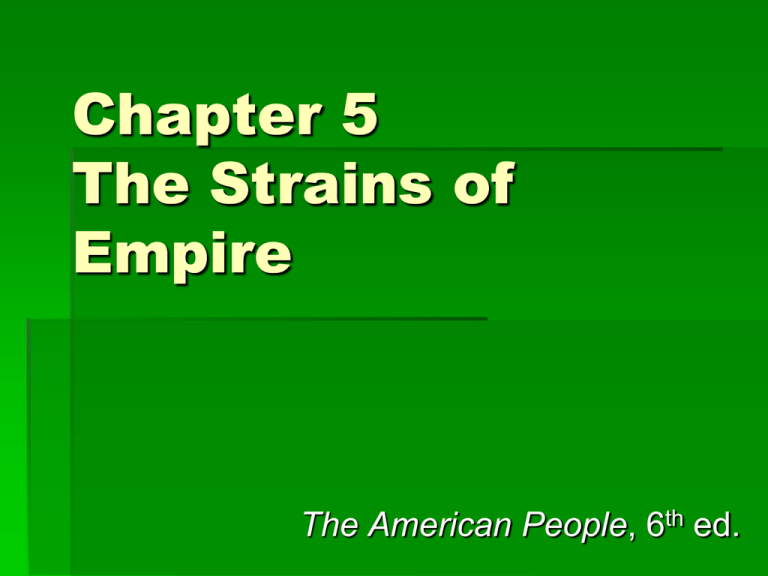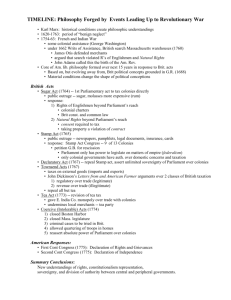Chapter 5 The Strains of Empire
advertisement

Chapter 5 The Strains of Empire The American People, 6th ed. I. The Climactic Seven Years’ War War and the Management of Empire Four times between 1689 and 1763, England and France engaged in wars that had far-reaching effects on their colonial governments in America. Besides warmongering, the English Parliament designated a long list of colonial exports that had to pass through English ports before sale. Outbreak of Hostilities English encroachment into the western territories of the French continued unabated into the 1740s with the establishment of the first English outpost on the Ohio River. Resistance by the French was swift; a line of French forts appeared along the river to Lake Erie. The European powers reinforced themselves in preparation for a final conflict in the New World. Tribal Strategies and Consequences of the Seven Years’ War Native tribes, especially the Iroquois, understood that their best chance for survival was to play the European powers against each other. The 1763 Treaty of Paris gave Britain control of Florida; Spain got New Orleans and French territory west of the Mississippi; the Indians got nothing. The wartime economy and English victory strengthened the colonies and assured their continued growth II. The Crisis with England Sugar, Currency, and the Stamp Act Riots Sugar Act of 1764: increased the list of items that could only be exported from the colonies via English ports. Currency Act of 1764: Parliament prevented any of the colonies from printing their own currency. Stamp Act of 1765: Parliament imposed duties on a wide range of items within the colonies such as playing cards, legal documents, or college degrees. Violent protests within the colonies followed. Parliament repealed the Stamp Act in 1766 but reserved power to subjugate colonies to British law under the Declaratory Act. Gathering Storm Clouds Townsend Duties of 1767 on paper, lead, pigment and tea. New York assembly dissolved for defiance of Quartering Act of 1765 mandating colonial support for British garrisons. Protest against the Townsend duties gradually took the successful form of economic boycott of English goods. Growing tensions led to the Boston Massacre, increased boycotts and the Boston Tea Party. In response to the boycotts and wanton destruction of English tea in Boston’s harbor, Parliament passed the Coercive Acts (Intolerable Acts) closing the port of Boston and prohibiting most town meetings. This action prompts the call for a First, and then Second, Continental Congress to deliver colonial grievances to an unsympathetic king. By 1774, most of the colonies had defied the crown and appointed new assemblies. III. The Ideology of Revolutionary Government Gradually, the colonists constructed a political worldview constructed from English political thought, the constructs of the Enlightenment, and aspects of their own unique experiences as colonists. Every despised Act of Parliament became viewed as an attack on traditional English liberty and colonial economic independence. IV. The Turmoil of a Rebellious People Although cities contained only five percent of the total colonial population, they were the birthplaces of revolutionary theory. Patriot women facilitated meaningful boycotts of English goods. Rural rebellion from farmers under the guise of the Regulators demanded the attention of English troops on the colonial frontier.






